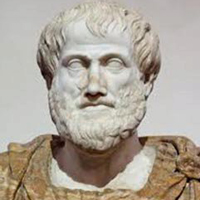Aristotle - Biography and Works
Aristotle was born in Stagira in northern Greece in 384 BC. Aristotle joined Plato's Academy in 367. Aristotle being disciple of Plato spent twenty years in the Academy as a student, lecturer and a writer. Aristotle's writings show the tireless efforts of an acute mind both to extend the range of human knowledge and to organize all knowledge according to a few central insights.

Aristotle (384-322 BC)
Aristotle, the most famous of Plato's students, disagrees with his own master Plato, about where to locate reality. He does not believe that the world of appearance is merely an ephemeral copy of changeless ideas. He believes rather in the change that it is a fundamental process of nature, which he regards as creative force. Reality, for Aristotle, is the process by which "a form manifests itself through the concrete and by which the concrete takes on meaning, working in accordance with ordered principles." The poet's imitation is analogous to its process. A poet takes a form from nature and reshapes it in different manner and medium. This medium is the source of each work's inward principle of order and consequently of its dependence from slavish copying (since there is the role of creativity). The poet is thus both an imitator and a creator in Aristotelian terms. Art is thus a sort of improvement on nature in which the poet has brought the completion to what nature is still endeavoring to complete.
Aristotle, approaches literature as if he were a classical biologist. He is the first critic to attempt, a systematic discussion of genres because he classifies and categorizes kinds of literature systematically and thus he begins with tragic drama. It appears that Aristotle means to answer Plato's criticism of the poet as a mere imitator of appearances. He avoids the idea that the world of appearance is merely an ephemeral copy of the changeless ideas. He holds the idea that change is the fundamental process of nature, which he takes as a creative force with a direction. For him, reality is the process by which a form manifests itself through the concrete and by which the concrete takes on meaning working in accordance to the ordered principles. By taking the form from nature, the poet reshapes it in a different manner, lasing different matter and medium. But this medium and matter is not the slavish copying. The poet is both an imitator and the creator. Aristotle, hence, believes in change, which is a fundamental process of nature, which he regards as a creative force. For Aristotle, art is a sort of improvement on nature in that the poet has brought to completion what nature is still trying to complete. Aristotle's attention to the poem as an object, capable of discussions in terms of its formal nature can be considered as the greatest contribution to literary theory.
